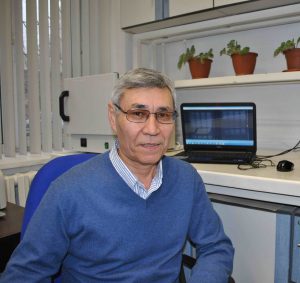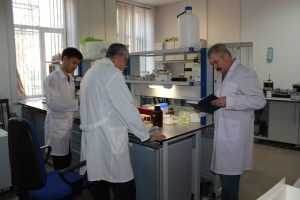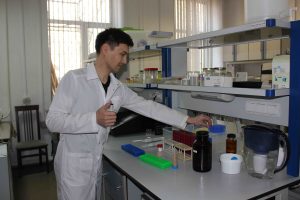A brief history of the Laboratory
The laboratory of grain crops biochemistry was organized in 1973 by Temirbai Baibusynovich Darkanbaev, who led it until 1986. From 1986 to 1988 the head of the laboratory was Professor Fursov Oleg Vladimirovich, Doctor of Biological Sciences. Since 1998 the head of the laboratory Khakimzhanov Aidar Atymtaevich Ph.D.
Khakimzhanov Aidar Atymtaevich
Head of the Laboratory of grain crops biochemistry
Ph.D. in biology
Phone: +7 (727) 293-71-90
E-mail: a.khakimzhanov@mail.ru
Aidar Khakimzhanov graduated from the biology faculty of C.M. Kirov Kazakh State University in 1979. He defended his Ph.D. thesis: “Amylolytic enzymes of rice grain and their regulation.” Specialist in plant biochemistry, grain enzymology (carbohydrate metabolism enzymes and their inhibitors) in 1990. He has more than 100 publications, five copyright certificates and patents. Under his supervision two Ph.D. dissertations and five master’s theses were prepared and successfully defended.
In 2016 he was awarded the “Certificate of Honor” of the Ministry of Education and Science of the Republic of Kazakhstan for high achievements in the field of fundamental and applied research in biochemistry and enzymology of grain crops, training of scientific personnel and many years of work at the institute. In 2021 Aidar Khakizhanov was awarded the honorary badge “Enbek ardageri”.
 The main directions of research activities
The main directions of research activities
-
- Study of the regulation mechanisms and enzymes of metabolism of the main reserve substances of cereal grains – starch and protein – amylase and protease complexes functioning;
-
- Study of biochemical properties and protein inhibitors of cereal grain amylase functioning;
-
- Study of the regulation and functioning of the enzymes of the defense system β-glucanase and chitinase in grain crops;
- Development of biochemical tests for wheat resistance to pre-harvest sprouting and fungal diseases (fusarium).
Research projects
2018-2020
Project АР05133823 “Study of chitin and β-glucan-binding enzymes in pathogenesis and their use in testing wheat resistance to Fusarium”, scientific supervisor – Khakimzhanov A.A. Ph.D.
2015-2017
Project 5584/GF4 “Study of the role of the protein inhibitor of α-amylase in the regulation of wheat resistance to pre-harvest germination and the development of an immunochemical test method for determining the inhibitor”, scientific supervisor – Khakimzhanov A.A. Ph.D.
2014-2016
Project O.0657 “Development of scientific bases for increasing the resistance of wheat and potatoes to fusarium and viroids based on the methods of molecular and cellular biology and the creation on their basis of initial lines and diagnostics for accelerated breeding”, scientific supervisor – Aitkhozhina N.A., Doctor of Biological Sciences, Professor, Academician of the National Academy of Sciences of the RK.
2012-2014
Program 055 “Development of domestic genomic-proteomic and cellular technologies for the needs of medicine, agriculture and environmental protection in Kazakhstan”, scientific supervisor – Aitkhozhina N.A., Doctor of Biological Sciences, Professor, Academician of the National Academy of Sciences of the RK.
Project GF 225 “Molecular-biological, biochemical and technological foundations for improving food security”, scientific supervisor – Aitkhozhina N.A., Doctor of Biological Sciences, Professor, Academician of the National Academy of Sciences of the RK.
Research methods
Spectrophotometry, gradient centrifugation, protein electrophoresis and isoelectric focusing, liquid column chromatography, enzyme immunoassay, cell culture.
Scientific achievements of the laboratory
- Features in the regulation of synthesis and secretion of α-amylase isoforms in the germ and aleurone layer of wheat were revealed. For aleuron cells, a strictly hormone-dependent induction of α-amylase has been established, while in the germinal shield, the synthesis of the enzyme is mainly regulated by carbohydrates by the type of sugar-metabolite repression. Many results are of priority and make a significant contribution to understanding the biochemical mechanisms of grain germination.
- The role of the main isozyme groups of wheat α-amylase α-AMY 1 and α-AMY 2 in the formation of the Falling Number, an important technological indicator of grain quality, was determined. The results are priority and are of great importance both in theoretical and applied aspects.
- A protein inhibitor of endogenous α-amylase of wheat grain has been isolated in a homogeneous form and characterized. The specificity of its action related to the two main isogroups of α-amylase has been established. New data on the physicochemical properties of the protein inhibitor have been obtained.
- For the first time data on the effect of sodium phytate on wheat α-amylase isoenzymes were obtained. A selective inhibitory effect of a natural chelator on α-amylase “germination” has been established. Along with a protein inhibitor, sodium phytate can be used as a quality improver for bread baked from flour with increased autolytic activity.
- The isozyme composition and organ localization of the protective enzymes β-1,3-glucanase and chitinase in wheat were studied. The characteristic of their physical and chemical properties and features of induction is given.
- A method for immunochemical testing of wheat for resistance to preharvest germination has been developed. The essence of the method lies in the detection of α-amylase isoenzymes characteristic of germinating grain using highly specific polyclonal antibodies. The sensitivity of the developed “sandwich” ELISA for the determination of α-amylase α-AMY 1 is from 5 to 0.05 μg of protein per 1 ml. The method was tested in laboratory conditions, 25 varieties and lines of soft spring wheat were tested for an increased content of “germination” α-amylase, among which genotypes that were relatively resistant and unstable to pre-harvest germination were identified.
- A new method for purification of an α-amylase/subtilisin inhibitor was developed using immobilized α-amylase α-AMY 1 of wheat as an affinity ligand.
 Каз
Каз Рус
Рус Eng
Eng